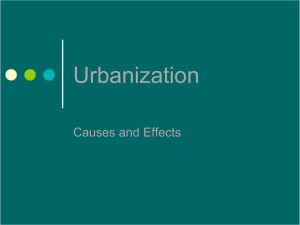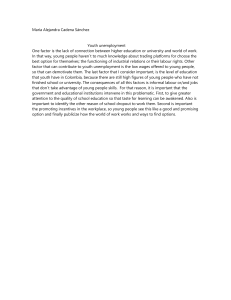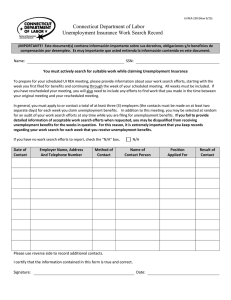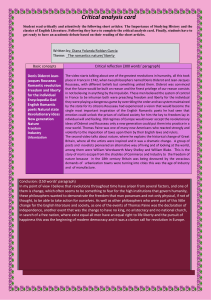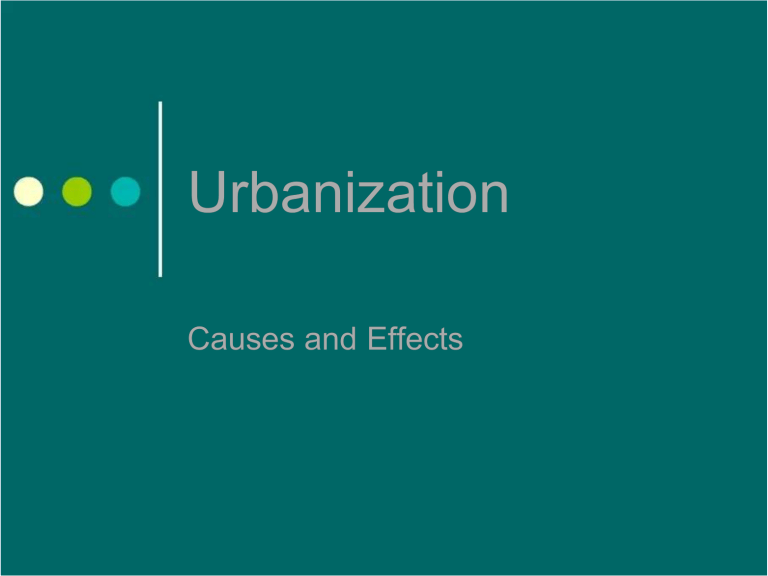
Urbanization Causes and Effects Urbanization Urbanization refers to a process in which an increasing proportion of a society live in cities and the suburbs of cities. Historically Historically,, it has been been closely connected with industrialization. Industrialization is a process that extensively uses inanimate sources of energy to enhance human productivity. ollowing industrialization, surpluses increased in both agriculture and industry industry.. !arger and larger proportions of a population could live in cities. Economic forces were such that cities became the ideal places to locate factories and their wor"ers. City or Urban #ettlement $ %city% refers to a place of relatively dense settlement && dense enough so that city residents can not grow their own food resources. $ city population, therefore, is always dependent upon its %hinterlands% to provide it with food resources. Causes of Urbanization Industrial 'evolution Industrialization following the Industrial 'evolution Emergence of large manufacturing centers (ob )pportunities $vailability of easy transportation *igration Chicago in +- /opulation +0 Chicago in +1 /opulation +2,1,030 Effects of Urbanization 4 /ositive 4 5egative /luses 6enefits include reduced transport costs, exchange of ideas, and sharing of natural resources. Cities act as beacons for the rural population because they represent a higher standard of living Cities offer opportunities to people not available in the countryside /luses #ocial 7 'eligious taboos8 sanctions disappearing Education is a tool to eradicate social evils Industrialization, Urbanization, Education, !egislation, #ecularizat #ecularization& ion& se9uence of development :iffusion of urban culture to rural areas *inuses Industrial cities were difficult places to live in due to; /ublic health issues resulting from contaminated water and air and the spread communicable diseases due to overcrowding. Unemployment and under employment #evere shortage of housing <ransportation&commuting <ran sportation&commuting issues, lac" of public transport, no ade9uate investment #ocial effects & poverty poverty,, lac" of opportunities, psychological problems, alcoholism, drugs, crime, violence and other deviant behaviors /ublic health #anitation & the settlements were ill e9uipped to handle large populations and their sanitation needs /ollution = Caused by effluents, smo"e and smog ire hazards = due to use of flammable materials and proximity8 congestion Epidemics & due to spread of communicable diseases caused by contaminated contaminated water 7 air Unemployment Unemployment is the condition of willing wor"ers lac"ing >obs or %gainful employment%. 6efore industrialization unemployment has been said not to have been recognized as an issue in rural areas, despite the %disguised unemployment% of rural laborers having little to do, especially in conditions of overpopulation Impact of unemployment on society Individual = failure to meet financial obligations such as purchasing food to feed oneself and one?s family, and paying one?s bills, failure to ma"e mortgage payments or to pay rent may lead to homelessness. #ocietal & rising unemployment increases the crime rate Housing )vercrowding !oss of privacy !ac" of housing contributes directly to crime, stress, and family brea"down #hortage of livable housing leading to growth of slums Human beings have a right to lead a life of dignity <ransportation Transport or transportation is the movement of people and goods from one place to another. 6ecause of the much higher densities of people and activities in cities, transportation is a "ey issue. Inade9uate8 lac" of public transport creates commuting problems leading to loss of efficiency. #ocial Effects & /overty /overty is generally defined at the individual or family level as not having enough money to buy basic necessities. /overty is caused by lac" of opportunities /overty causes malnutrition and illness@ it is a ma>or source of mental stress and loss of self&esteem which may lead to depression, and have a further negative impact on health. #ocial Effects & Crime inancial insecurity 5o welfare systems in place !ac" of meaningful wor" A!ow importance to meaningful wor" and high importance to higher profits and greater efficiencyB $nonymity &direct correlation between higher crime rate and higher rootlessness Urbanization in India In India, about D of the population lives in cities. <he process of urbanization is still nascent in the Indian context. $ncient India was a civilized society with many urban centers and centers of learning. Early Urbanization & *ohen>odaro Harappa Capitals & anau> & U>>ain 'eligious Centers & 6odh Faya & Ga Garanash ranashii University Univer sity towns & <a"shas "shasila ila 5alanda *ughal Cities $gra !ahore atehpur #i"ri <he seven cities of :elhi Colonial Cities = :elhi, /ondicherry, Foa Cantonment <owns = 6angalore, #ecunderabad, 5agpur,!uc"now Hill 'esorts = #himla, 5ainital, :ar>eeling, )oty, odai"anal /orts = #urat, *umbai, Calicut, ol"atta, Gizag, Chennai Effects of Colonization Introduction of estern systems of education *acaulization Aafter !ord *acaulayB of Indian Education :evelopment of labor force& s"illed8 uns"illed Independent India $dministrative capitals = Center Center 7 #tate Industrial <owns = 6hilai, 'our"ela, (amshedpur, $hmedabad, #urat, olar <oday *egacities = *umbai, :elhi, ol"atta, Chennai, 6angalore, Hyderabad 'apid Urbanization& rate of urbanization increasing <he process of urbanization is still nascent in the Indian context. <his explains the focus of global attention on the developing nations. <here are huge profits to be made in the process of development.
